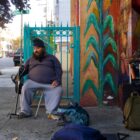By Bethany Fleishman
The Public Press
| Digital television converter boxes on sale. Photo by Bethany Fleishman/The Public Press. |
Tens of thousands of Bay Area residents could wake up to a blank television screen on June 12, when all broadcast television programs officially go digital and abandon their analog signals. Those most at risk of losing their TV signal are seniors, residential hotel tenants and non-English speakers.
Tracy Rosenberg, executive director of the Oakland-based Media Alliance, estimated that roughly one million people nationwide will lose their signals. In the Bay Area, that number could top 65,000, and many people are calling Media Alliance for help.
“Here it is three days before the changeover and we are inundated with phone calls,” Rosenberg said.
Even though the Federal Communications Commission (FCC) has run extensive information and outreach campaigns through community organizations, many have still not got the message about the analog-to-digital transition. Substantial numbers of people have yet to purchase a converter box, get a new digital TV or subscribe to cable or satellite service.
Access to television may seem a trivial issue to some, but television remains the main news source for most Americans, according to the Pew Research Center. Many people, especially seniors and the disabled, also rely on television for entertainment and companionship. “Television is no longer an item of luxury, it’s a necessity,” said Anni Chung, president of Self Help for the Elderly, which serves Chinese seniors and is helping them make the transition. She added television is “a lifeline” for many.
Other Bay Area organizations are hearing from a steady stream of people needing help to make the transition: getting a $40 coupon for the converter box from the National Telecommunications and Information Administration; buying the converter; installing the box. All this can be difficult for seniors, the housebound, the disabled and members of non-English-speaking communities.
“It’s a very serious problem,” said Rudi Asercion, executive director of West Bay, a non-profit that serves San Francisco’s Filipinos. Asercion estimates that 70 percent of the 2,500 seniors served by West Bay annually don’t know what’s going on, so the center is holding demonstrations on how to install converter boxes. Asercion said many clients don’t speak English very well, but mainly “they really don’t understand the technical aspect to the digital world. My sense is that they will wake up on June 12, turn on the TV and be shocked — nothing.”
Rocky transitions
“The majority of people will transition smoothly,” said Media Alliance’s Rosenberg. But she warned that “pockets of the most vulnerable sector of society who already face a lot of challenges” are having a hard time making the transition.
FCC representative Glenn Phillips cited a Nielson Media Research survey in May that showed 2.8 percent of Bay Area residents were “completely not ready” for the transition. That is roughly 196,000 people out of a regional population of over seven million. Rosenberg estimated that one third — more than 65,000 — “haven’t heard about it or don’t know how to proceed.” The other two thirds are waiting until the last minute to make the switch or are waiting for their coupons to arrive in the mail.
Chung said Self-Help for the Elderly receives 100 to 150 calls every day for its in-home service to install converter boxes. “From our gut level, from calls and walk-ins, the elderly non-English-speaking figure is double” the Nielson figure, said Chung. “That’s what we’ve been telling the FCC. If it were that low, we wouldn’t be getting that many calls,” she added.
The FCC originally set February 2009 for the analog to a digital transfer, but Congress voted to push it back to June 12. Rosenberg cited two reasons: First, the National Telecommunications Information Administration, which was supposed to administer disbursement of the $40 coupons for the digital converter boxes, fell so far behind in providing coupons that the government had no choice but to delay the transition. Second, the transition was spearheaded by the Bush administration and the incoming Obama administration did not want to push a transition through one month after coming into office without making sure it was done right.
There is an economic aspect to the transition. People who can afford cable or satellite subscriptions don’t have to change anything, but people who rely on free over-the-air broadcasts — often the most economically disadvantaged — must either buy a digital television or connect a converter box to their analog set. Converters cost from $50 to over $200, and households can sign up for two $40 coupons for two boxes. But coupons cannot be combined to purchase one box.
| Digital television converter boxes on sale. Photo: Bethany Fleishman |
If that weren’t bad enough, once people have the coupon, many seniors and disabled can’t just “take themselves down to Best Buy” and get the converter set up at home, said Kenneth Maxey, campaign coordinator for the Leadership Council on Civil Rights Education Fund. Aside from issues of mobility, many find the conversion technology tricky. Maxey added that it is not just the elderly: “A lot of people are bad with technology.”
Media Alliance, Self-Help for the Elderly and the Southeast Asian Community Center in San Francisco all receive FCC money through the Leadership Council to reach those in need of help. The goal, said Maxey, is to “create infrastructure through community-based organizations and community leaders, who know who and where people are most affected.”
In addition to outreach efforts, local television networks have been airing ads and public service announcements about the transition for months. Still, said Philip Nguyen of San Francisco’s Southeast Asian Community Center, “No matter how much information goes through different channels, still some people are not aware.”
For those who cannot or do not make the June 12 deadline, the federal coupon program lasts until the end of July. Local outreach will continue into summer or later. Nguyen said his organization will work past the deadline "until nobody comes to us” — with or without federal funding.
The SRO digital divide
Some of the most disenfranchised are automatically disqualified from getting FCC coupons. Many single-room occupancy (SRO) tenants cannot get the converter coupons, because they can only be sent to individual home addresses. This excludes many of the 30,000 San Franciscans living in SRO hotels because SROs do not generally have individual mailboxes.
Although SRO hotels are required by a 2006 city ordinance to provide private locked mailboxes to each unit, qualifying each as a separate home address, the U.S. Postal Service is balking. According to Peter Masiak, lead tenant organizer for the Central City SRO Collaborative, the Postal Service refused to add the extra SRO boxes to its routes, citing financial constraints.
Compounding the problem: SROs are rarely wired for cable, thus tenants must either buy a new television or get a converter box at full price. Masiak said he has told SRO tenants to ask their friends to share extra coupons.
Last fall San Francisco’s Meals on Wheels program also discovered problems serving SRO-based clients when it helped more than 200 housebound seniors sign up for converter box coupons. So many of the clients lived in SROs that Meals on Wheels wound up purchasing converter boxes out of its own budget, said Ashley McCumber, executive director of Meals on Wheels.
Another problem, said McCumber, is that advertising by cable companies misled many people to sign up for cable, thinking it was the only way to transition to digital — a dramatically more expensive option than buying a converter box.
In contrast, the situation is very different at the Noe Valley Senior Center, which serves English-speaking clients with higher incomes. “Most of them are ready. They have cable," said Wendy Cohen, the center’s site coordinator. "A couple others don’t watch TV so they aren’t worried.”
And that is the problem in a nutshell. For those who are already digitally literate the transition is no big deal, but for those who are not it could be traumatic. This, said Masiak of the City SRO Collaborative, “is the issue with the digital divide in general. There is a widening gap between people who have access to information and those that don’t.”
#
For transition assistance in San Francisco, contact Self-Help for the Elderly DTV Assistance Center Hotline at 1-800-958-2999 or the Southeast Asian Community Center at 415-885-2743. In Oakland, contact Media Alliance at 510-832-9000.
For more information on the digital television converter coupon program, visit https://www.dtv2009.gov/ or call 1-888-DTV-2009. General information and questions about the digital television transition can be found at http://www.dtv.gov/.









